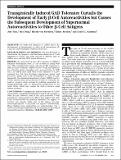| dc.contributor.author | Tian, Jide | |
| dc.contributor.author | Dang, Hoa | |
| dc.contributor.author | von Boehmer, Harald | |
| dc.contributor.author | Jaeckel, Elmar | |
| dc.contributor.author | Kaufman, Daniel L. | |
| dc.date.accessioned | 2011-03-04T17:32:22Z | |
| dc.date.issued | 2009 | |
| dc.identifier.citation | Tian, Jide, Hoa Dang, Harald von Boehmer, Elmar Jaeckel, and Daniel L. Kaufman. 2009. Transgenically induced GAD tolerance curtails the development of early β-cell autoreactivities but causes the subsequent development of supernormal autoreactivities to other β-cell antigens. Diabetes 58(12): 2843-2850. | en_US |
| dc.identifier.issn | 0012-1797 | en_US |
| dc.identifier.uri | http://nrs.harvard.edu/urn-3:HUL.InstRepos:4737556 | |
| dc.description.abstract | Objective: To study how tolerance to GAD65 affects the development of autoimmunity to other β-cell autoantigens (β-CAAs) in GAD65-transgenic (GAD-tg) NOD mice. Research Designs and Methods: We used ELISPOT to characterize the frequency and functional phenotype of T-cell responses to GAD65 and other β-CAAs at different ages in GAD-tg mice and their NOD mouse littermates. Results: In young GAD-tg mice, Th1 responses to GAD65's dominant determinants were 13−18% of those in young NOD mice. This coincided with a great reduction in Th1 responses to other β-CAAs. Evidently, GAD65-reactive T-cells are important for activating and/or expanding early autoreactivities in NOD mice. As GAD-tg mice aged, their T-cell responses to GAD65 remained low, but they developed supernormal splenic and pancreatic lymph node T-cell autoimmunity to other β-CAAs. Apparently, the elimination/impairment of many GAD65-reactive T-cells allowed other β-CAA–reactive T-cells to eventually expand to a greater extent, perhaps by reducing competition for antigen-presenting cells, or homeostatic proliferation in the target tissue, which may explain the GAD-tg mouse's usual disease incidence. Conclusions: Transgenically induced reduction of GAD65 autoreactivity curtailed the development of early T-cell responses to other β-CAAs. However, later in life, β-CAA–reactive T-cells expanded to supernormal levels. These data suggest that early β-cell autoreactivities are mutually dependent for support to activate and expand, while later in the disease process, autoantigen-specific T-cell pools can expand autonomously. These findings have implications for understanding type 1 diabetes immunopathogenesis and for designing antigen-based immunotherapeutics. | en_US |
| dc.language.iso | en_US | en_US |
| dc.publisher | American Diabetes Association | en_US |
| dc.relation.isversionof | doi://10.2337/db08-0851 | en_US |
| dc.relation.hasversion | http://www.ncbi.nlm.nih.gov/pmc/articles/PMC2780885/pdf/ | en_US |
| dash.license | LAA | |
| dc.subject | immunology and transplantation | en_US |
| dc.title | Transgenically Induced GAD Tolerance Curtails the Development of Early β-Cell Autoreactivities but Causes the Subsequent Development of Supernormal Autoreactivities to Other β-Cell Antigens | en_US |
| dc.type | Journal Article | en_US |
| dc.description.version | Version of Record | en_US |
| dc.relation.journal | Diabetes | en_US |
| dash.depositing.author | von Boehmer, Harald | |
| dc.date.available | 2011-03-04T17:32:22Z | |
| dash.affiliation.other | HMS^Pathology | en_US |
| dc.identifier.doi | 10.2337/db08-0851 | * |
| dash.contributor.affiliated | von Boehmer, Harald | |


